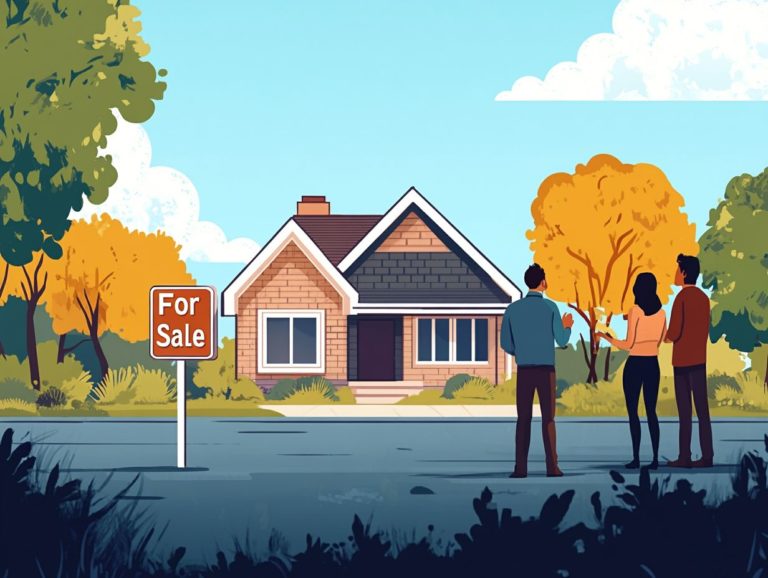How to Make an Offer on a House?
Buying a home is a thrilling yet intricate journey, rich with significant choices.
Grasping the home buying process is vital from the initial excitement of house hunting to crafting an offer that could transform your dream into reality.
This guide delves into the motivations behind making an offer, the essential factors to contemplate beforehand, and the tactics for negotiating with finesse. It also explains what happens after your offer is accepted. Get ready to confidently step toward your new home!
Contents
- Key Takeaways:
- Understanding the Home Buying Process
- Why Make an Offer on a House?
- Factors to Consider Before Making an Offer
- How to Make an Offer on a House
- Negotiating the Offer
- What Happens After an Offer is Accepted
- Frequently Asked Questions
- Can I make an offer on a house without an agent?
- What factors should I consider when making an offer on a house?
- How do I determine the right price to offer on a house?
- Should I include contingencies in my offer?
- How long does it take for the seller to respond to an offer?
- What happens if the seller rejects my offer?
Key Takeaways:

Learn about the home buying process and how to make a smart offer.
Making an offer on a house can secure your dream home and potentially save you money.
Consider market conditions, and the property’s condition and features before making an offer.
Understanding the Home Buying Process
Understanding the home buying process is essential for prospective buyers aiming to navigate the often intricate landscape of real estate transactions, especially in today s ever-changing housing market.
From securing mortgage preapproval to considering a cash offer, each step is vital in successfully purchasing your new home. Familiarize yourself with concepts like an upfront payment that shows you re serious about buying the home, the role of a buyer’s agent, and the significance of conducting a thorough market analysis to determine property values.
Knowing these elements will enable you to make informed decisions throughout the offer process, ensuring a more seamless journey toward homeownership.
Steps to Buying a House
The journey to buying a house usually kicks off with obtaining mortgage preapproval a critical first step that helps you grasp your budget and streamline the offer process. This initial phase not only reveals how much you can borrow but also bolsters your position when making offers, since sellers tend to favor serious buyers.
Once you’ve secured preapproval, the next step involves finding a knowledgeable buyer’s agent who can expertly guide you through the housing market. This agent will assist you in identifying properties that suit your needs, negotiating offers, and navigating any challenges that may crop up along the way.
After selecting the perfect home, you’ll make an offer that aligns with your budget and current market conditions. It s essential to understand the upfront payment that shows you re serious about buying the home, and to be aware of closing costs, which include various fees associated with the transaction.
Being informed about these elements is key to ensuring a smooth closing process.
Why Make an Offer on a House?
Making an offer on a house is a pivotal moment in your home-buying journey, signaling your intent to purchase and paving the way toward homeownership in a competitive real estate market.
In a seller’s market, where demand frequently outstrips supply, crafting a compelling offer becomes essential to securing a property. This might involve strategies like making a cash offer or carefully assessing market conditions to formulate an informed proposition.
By grasping the intricacies of the offer process, you not only position yourself to present your best case but also significantly enhance your chances of having your offer accepted.
Benefits of Making an Offer
The benefits of making an offer on a house go far beyond simple intent; they present you with the chance to engage in negotiation tactics that could result in a favorable purchase agreement.
When you secure a property through an offer, it showcases your earnest interest and opens the door for negotiating the price and other essential terms. In competitive real estate markets, this proactive approach can be your ticket to locking in your desired home before it slips through your fingers.
Crafting a well-thought-out offer letter adds a personal touch, effectively highlighting your genuine intentions. Including an upfront payment that shows you re serious about buying the home demonstrates your commitment, making your overall proposal more enticing to sellers.
Such strategic elements are pivotal in shaping negotiations and provide a solid foundation for all parties to reach agreeable terms.
Factors to Consider Before Making an Offer

Think about key factors before making an offer on a house. These elements can significantly impact your buying strategy and the price you pay.
Taking the time to assess these elements will enable you to make informed decisions and maximize your investment.
Market Conditions
Market conditions play a vital role in deciding when to make an offer. They influence both your buying approach and pricing.
Understanding the differences between a buyer’s market and a seller’s market is crucial.
In a buyer’s market, where inventory is plentiful, you have the upper hand. This allows for better negotiations and potentially lower prices.
In a seller’s market, characterized by high demand and limited supply, sellers are more selective. This can create competitive bidding scenarios that may require you to increase your offer.
Grasping these dynamics helps you tailor your strategies, ensuring your decisions align with current market conditions for the best outcomes.
Property Condition and Features
Check the property’s condition and features before making an offer. They affect its value and your satisfaction.
Conducting a thorough property inspection is essential. This step helps uncover hidden issues that could lead to costly repairs later.
Understanding the condition of crucial elements like the roof, plumbing, and electrical systems strengthens your negotiating position.
If significant repairs are needed, adjust your offer or request that the seller address these concerns before the sale.
This careful evaluation ensures you invest wisely and feel confident in your purchase.
How to Make an Offer on a House
Making an offer on a house is an important step. You’ll need to write a strong offer letter.
Work with a buyer’s agent to develop a purchase agreement that meets your needs and resonates with the seller’s interests.
Steps to Submitting an Offer
Start by writing a clear offer letter that states your intentions. Include an earnest deposit to show you are serious about the purchase.
Your letter should express enthusiasm for the property while highlighting your strengths as a prospective homeowner.
Next, determine an appropriate earnest deposit. This amount signifies your commitment and usually represents a percentage of the purchase price.
Effective negotiation strategies are crucial. Know the seller’s priorities, make well-timed counteroffers, and be open to compromise to reach a mutually beneficial agreement.
By following these structured steps, you can navigate the offering process with confidence.
Negotiating the Offer

Negotiating the offer is a key step in buying a home. It requires smart thinking and good negotiation skills.
This is your chance to secure a favorable outcome, whether that means the seller accepts your terms or further discussions are necessary.
By carefully considering these steps, you can confidently embark on your home-buying journey!
Strategies for Successful Negotiation
Employing effective negotiation tactics is essential for achieving success in a competitive market. Strategies like presenting a cash offer can greatly enhance the appeal of your proposal as a buyer.
By understanding the dynamics of the market and assessing your competitors positions, you can adopt a more informed approach. This may involve analyzing recent sales trends or pinpointing the unique selling points of similar properties to identify your leverage.
Offering incentives such as covering closing costs or providing a flexible move-in date can create a significant impact. Ultimately, being aware of these elements not only strengthens your negotiation strategy but also fosters better communication, paving the way for a win-win scenario for everyone involved. Act now to enhance your chances!
What Happens After an Offer is Accepted
Once your offer is accepted, you step into a crucial phase of the home buying journey. This involves finalizing the purchase agreement and understanding closing costs, while preparing for the final closing of your new home.
Next Steps in the Home Buying Process
The next steps in your home-buying journey include several crucial tasks: finalizing your mortgage preapproval, conducting a property inspection, and arranging for a home appraisal.
These actions are essential for ensuring a smooth transition into homeownership. Each step is designed to protect your investment and confirm the property’s suitability.
Make completing your mortgage approval a priority; this solidifies your financing and paves the way for closing.
Schedule a thorough inspection to uncover any potential issues that could influence your decision. Arrange for a professional appraisal to validate the property’s market value and meet your lender’s requirements.
By diligently navigating through these steps, you can tackle the complexities of home buying with confidence, enhancing your overall experience along the way. Start your home-buying journey today!
Frequently Asked Questions
Can I make an offer on a house without an agent?

Yes, you can make an offer on a house without an agent. However, it is recommended to have a real estate agent to guide you through the process and ensure that all legal and financial aspects are properly taken care of.
What factors should I consider when making an offer on a house?
Some important factors to consider when making an offer on a house include current market conditions, the condition of the house, the seller’s asking price, and your own budget limitations. It is also important to get a home inspection and consider any potential repairs or renovations that may be needed.
How do I determine the right price to offer on a house?
To determine the right price to offer on a house, research similar properties in the area and compare their sale prices. You can also get a professional appraisal or seek advice from a real estate agent.
Should I include contingencies in my offer?
Contingencies are clauses that allow you to back out of the deal if certain conditions are not met. It is recommended to include contingencies in your offer, such as a home inspection contingency, financing contingency, or an appraisal contingency, to protect yourself from potential issues that may arise.
How long does it take for the seller to respond to an offer?
The seller typically has 24-48 hours to respond to an offer, but it can take longer if they are considering multiple offers. The response time can also vary depending on the seller’s personal circumstances and the complexity of the offer.
What happens if the seller rejects my offer?
If the seller rejects your offer, you can either make a counteroffer with a higher price or walk away from the deal. It is important to keep communication open with the seller and be prepared to negotiate in order to reach a mutually beneficial agreement.






